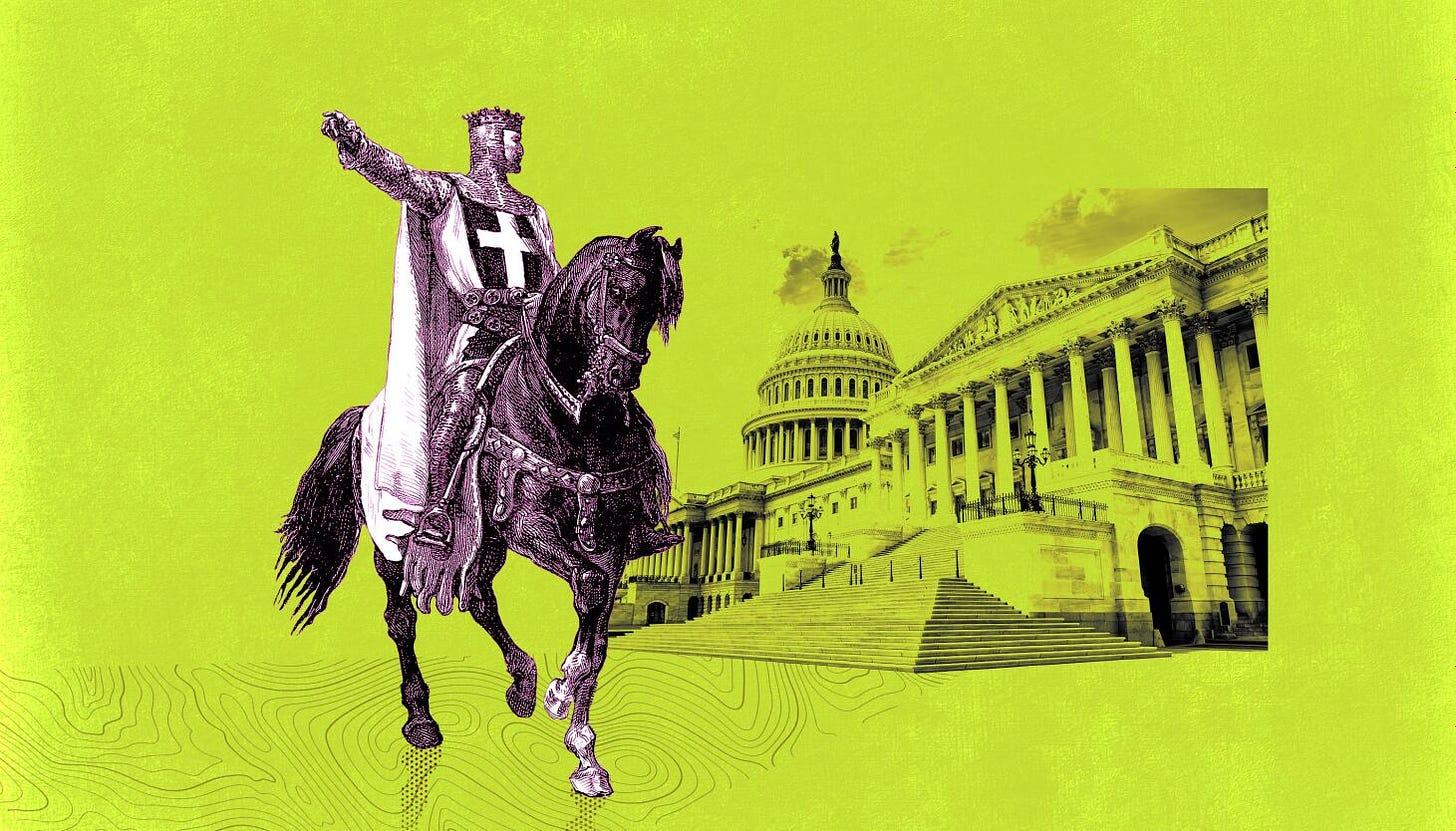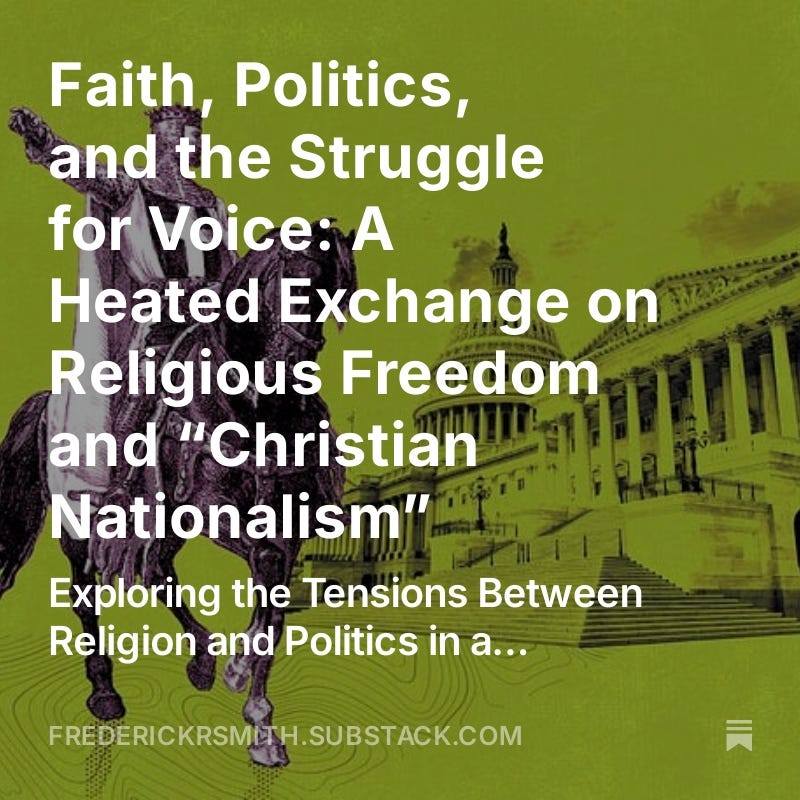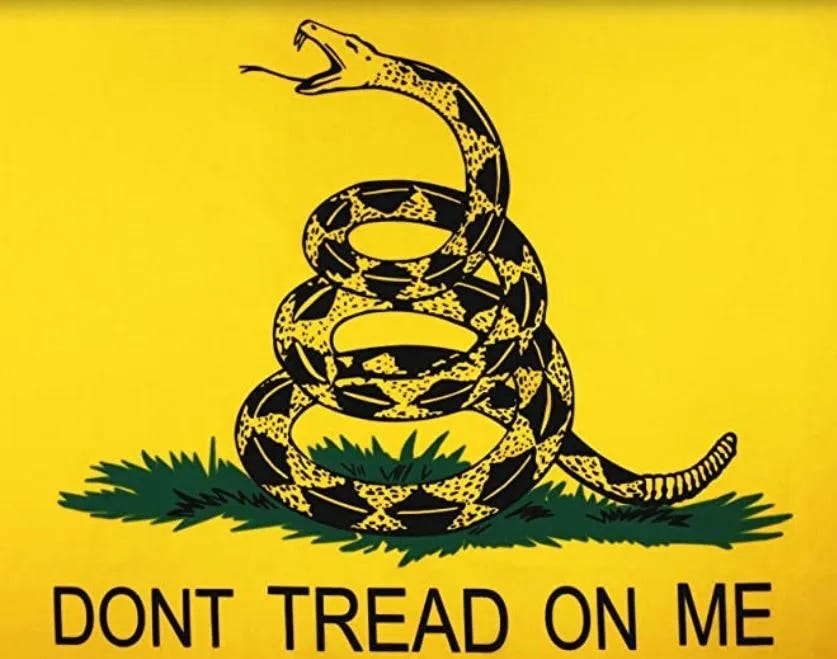Faith, Politics, and the Struggle for Voice: A Heated Exchange on Religious Freedom and “Christian Nationalism”
Exploring the Tensions Between Religion and Politics in a Republic at Crossroads
Rather than defending a robust pluralism – the idea that the free exchange of ideas should be open to all groups – the “viewpoint diversity” index and ADF’s [Alliance Defending Freedom] related lobbying suggest the group’s goal is to limit that free exchange to align with its own sectarian beliefs. By leveraging the power of government, it can restrict publicly traded corporations’ ability to make their own policy choices to support anti-racist and LGBTQ+-inclusive initiatives, which are widely popular with the general public.
Southern Poverty Law Center - ‘Viewpoint diversity’ advocacy promotes white nationalist talking points
Words 2,056 | Read Time 10 min | Enjoy
Opening Salvo
In the above quote, the Southern Poverty Law Center (SPLC) says, in effect, Christians are “…leveraging the power of government.” That is a quixotic view defying reality. Further, the SPLC engages in gaslighting to “… align with its own … beliefs.” Projection.
Foreword
This essay is a rehash of a Substack note I posted on August 15, 2024, which initially focused on the “sandwich smear” tactics employed by the Southern Poverty Law Center (SPLC). The original discussion began with a critique of the SPLC’s labeling of efforts to promote free speech and religious freedom as “white supremacists.” This label was applied to the Alliance Defending Freedom’s “Viewpoint Diversity Score,” which ranks large corporations based on their stance toward religious freedom. The SPLC’s characterization of this effort as promoting “white nationalist talking points” sparked a vigorous exchange.
The following exchange, which occurred in response to my note, is presented entirely, with the responding person remaining unnamed. The dialogue underscores the tension between differing perspectives on the role of religion in politics, the implications of the dogmatic secular narrative of “Christian Nationalism,” and the broader issue of religious expression in public life. It highlights difficulties in navigating these complex topics, especially when viewpoints are deeply entrenched.
The conversation reflects the broader societal debate about the intersection of faith and governance and the challenge of ensuring that all voices, religious or otherwise, are heard and respected in our democratic process.
The Dialog
Socialist Propagandists Liars & Crooks (SLPC) recently branded an effort to foster free speech and religious freedom as “white supremacist.” Last week (August 6, 2024), the SPLC released a report against Alliance Defending Freedom for its “Viewpoint Diversity Score,” a program that ranks large corporations based on their unfriendliness toward religious freedom. According to the SPLC, the effort to call out megacorporations amounts to promoting “white nationalist talking points.”
Get it? We are being gaslighted, much like Alex in A Clockwork Orange.
Wow! Such a drama queen! You need to lighten up. It's called Separation of Church and State!
It is about the people’s freedom to engage in their religion of choice and express themselves.
Well then express yourself. It has nothing to do with the Constitution. I mean the Church is already not paying taxes and if the Church wants to get involved in politics then the Church should pay taxes. Just don’t shove it down someone’s throat.
Your assertion touches on several important issues that deserve careful consideration. While I understand your concerns, I’d like to offer a response that clarifies some key points.
Firstly, freedom of expression is a fundamental right protected by the First Amendment of the United States Constitution. This right extends to all individuals and organizations, including religious entities. Religious groups exercise this constitutional right when they express their views on social or political matters. It’s not about “shoving it down someone’s throat” but rather about participating in the marketplace of ideas, which is essential to a functioning democracy.
Secondly, the role of religious organizations in public discourse is not only legitimate but historically significant. Religious groups have played crucial roles in movements such as the Civil Rights Movement, where their voices were integral to advancing social justice. Suggesting that the Church should remain silent unless it pays taxes reflects a misunderstanding of the Constitution’s Establishment Clause, which prevents the government from endorsing a particular religion but does not bar religious organizations from engaging in political life. The idea that religious expression is somehow coercive misinterprets the nature of public discourse. Expressing a religious or secular viewpoint is not the same as forcing someone to adopt that viewpoint. Silencing religious expression could be seen as an attempt to impose a secular lifestyle on others, which would be just as problematic.
Regarding the tax-exempt status of religious organizations, this status is not a privilege granted in exchange for political silence. It is based on the recognition that religious organizations contribute to the public good in various ways, such as through charitable activities and community support. The argument that they should pay taxes if they engage in politics overlooks their broader societal role and the importance of allowing all voices, including religious ones, to participate in the democratic process.
Finally, the idea that the Church should stay out of politics unless it pays taxes is grounded in a flawed understanding of democratic participation. Politics is not the exclusive domain of secular entities; it is a space where all citizens and groups, religious or otherwise, have the right to express their views. Excluding religious organizations from this process would undermine the democratic principle of equal participation.
In conclusion, while your concerns about the separation of church and state are valid, it is important to recognize that religious organizations have the same rights as any other group to express their views and participate in public discourse. This is not about forcing beliefs on others but about ensuring that all perspectives are heard in a diverse society. Valuing freedom of expression means listening to all sides, even when disagreeing.
No one is stopping you from expressing your beliefs. True religion is behind a lot of the civil rights movement. Especially when Dr. Martin Luther King was alive but not so much with the Christian White Nationalists movement. There seems to be little if any tolerance for other religions or cultures including atheists. Again, religion has no place in our politics. Your argument relys (sic) too heavily on First Amendment rights.
It’s essential to recognize that the First Amendment is a cornerstone of American democracy, safeguarding the freedom of religion and the expression of religious beliefs in public and private spheres. To suggest that religion should have no place in politics overlooks the profound and positive impact of faith-based perspectives on social movements, including the Civil Rights Movement led by Dr. Martin Luther King Jr.
The term “Christian Nationalism” has increasingly been used as a broad and often unfair label—a battering ram, if you will—to target and discredit a wide range of Christian beliefs. This “sandwich smear” tactic has been applied too liberally, lumping together diverse Christian perspectives under a single, negative banner. It’s important to differentiate between the dangerous, exclusionary ideas of actual nasty players and the broader Christian community, which encompasses a wide array of beliefs and practices.
Furthermore, the FBI’s recent targeting of several Catholic churches as potential hubs for “right-wing terrorism” is a troubling and shameful episode in our recent history. It highlights a disturbing trend where religious groups are unfairly scrutinized or vilified based on broad and sometimes unfounded assumptions.
Arguing that religion has no place in politics suggests that individuals must set aside their beliefs when engaging in civic life. This expectation contradicts the very essence of the First Amendment, which ensures that all voices—religious or secular—can contribute to the public discourse. The strength of our democracy lies in its ability to accommodate a diversity of perspectives, and it would be detrimental to exclude religious viewpoints from the conversation.
The focus should not be on silencing religious voices but ensuring that all beliefs and cultures are respected and allowed to coexist in the political arena. Through this inclusive approach, we can foster a society where everyone has the freedom to express their values and contribute to the common good.
I tire of your boring lectures trying to dignity (sic) mixing religion with politics when the Constitution is clear. Christians Nationalism is indeed a clear and present danger to our democracy. I’m done here.
Clearly, you strongly oppose the idea of simply agreeing to disagree on this issue. By asserting that “Christians (sic) Nationalism” is a “clear and present danger,” you’re not just expressing an opinion; you’re making a statement about the “risks it poses to democracy.” Ignoring the contributions and values of other Christians while making this claim can be problematic. For instance, the harsh treatment of the then Senator Kamala Harris toward a federal court nominee for being Catholic raises concerns about the potential for religious discrimination. This example highlights the importance of approaching these discussions with nuance and fairness rather than painting all religious expressions in politics with the same broad brush.
Christian White Nationalism is indeed a recognized hate group by the Southern Poverty Law Center among many others located throughout the US. It is not imagined. Again Christianity is not the only religion in this country. More and more people are turning away from religion because of the narrow mindedness and unnecessary restrictions. Whether we like it or not science is the rule of the day.
Your response seems to reflect religious intolerance and dismisses my earlier point about the unjust treatment of Catholics by Kamala Harris—this omission speaks volumes. Relying on the SPLC as the definitive source also tells a story, particularly when it fails to acknowledge left-wing dangers such as ANTIFA. While Christian “White” Nationalism is indeed recognized as a hate group by the left-wing SPLC and others, it’s important to remember that sect is one small element of the overarching Christian society, not just “White.” The are many additional Christian groups, as well as other religions, in this country, not just “White.” The growing number of people turning away from religion due to perceived narrow-mindedness and restrictions is noted. Still, it’s crucial to recognize that science [now politically corrupted] is not the sole arbiter of truth in our diverse society.
Let’s agree to disagree. Sadly, I have often found that radical secularists rarely have the courtesy to do so. But I’m willing to do that with you. Even though you stated, “I’m done here” a few threads ago, I will even extend the courtesy of letting you have the last word. Is that narrow-minded?
Conclusion
This exchange highlights the deep divisions and passionate views that emerge when discussing the intersection of religion and politics. The person responding, who uses a stylized image of Kamala Harris as her (?) avatar, illustrates the intensity of opposition to religious involvement in political discourse, particularly regarding Christian perspectives. Their argument, focusing on the perceived dangers of Christian Nationalism, underscores a broader societal concern about the role of religion in governance.
However, the conversation reveals the importance of approaching such debates with nuance and understanding that not all religious expressions are alike. While there are legitimate concerns about the potential for religious overreach in politics, dismissing all religious involvement can be equally problematic, as it risks alienating a significant portion of the population whose beliefs are integral to their civic engagement.
It is important to note that I used the word “democracy” in this discussion primarily to keep the conversation flowing. Going down that rabbit hole would likely make the responder go off the deep end. However, as Benjamin Franklin aptly reminded us, we live in a republic—if we can keep it. This distinction is critical, as a republic is designed to protect the rights of all individuals, including those of minority viewpoints, from being overridden by the majority. Ensuring that our republic remains strong requires balanced and respectful dialogue, where all perspectives, religious or secular, can contribute to the public discourse. Only through such a truly inclusive engagement can we preserve the principles that underpin our nation.
Anti-Woke Closing
Play it often; play it loud. Irriate the Willfully Overlooking Known Evil (WOKE) ecosystem. 📕
I warmly encourage you to consider becoming a paid subscriber if you have the means. Tips are appreciated, too. Regardless of your choice, your support is deeply appreciated. From the bottom of my heart, thank you for your invaluable support!









That was superb Frederick! You intricately explained the whole point of free speech in a society, against the backdrop of a clearly biased viewpoint that too readily drank the KoolAid.
The apparent number of white supremacist "groups" did in fact grow tremendously in the '00s and '10s. However, the actual number of white supremacists in the United States shrank. The explanation, which I had worked out by the time I left the world of "hate speech monitoring" in 2016, is that the internet allows a shrinking, ever-splintering category of people to find one another and form multiple virtual "groups" over time, creating the appearance of proliferating hate groups. If ideological white supremacy was a real threat to the US Constitution and our American way of life, there would be broad, popular organization under some sort of unifying banner. We see the opposite because it is in fact a very marginal ideology.